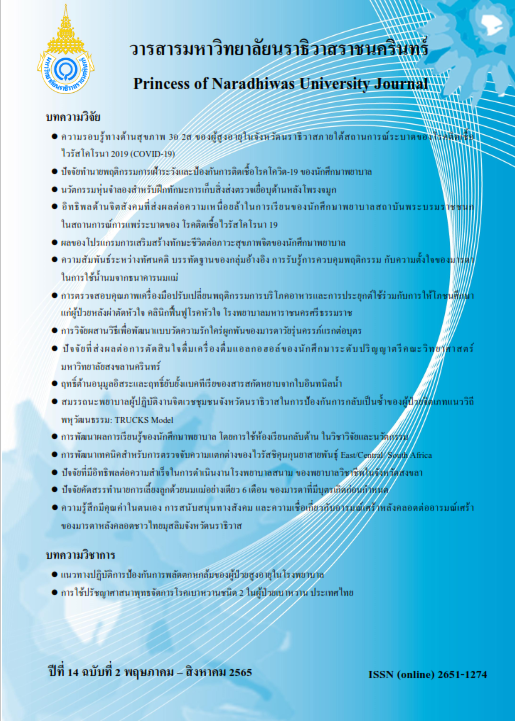Validation of Food Consumption Tool and Application for Nutrition Education of Post-Operative Heart Patients in Cardiac Rehabilitation Clinic, Maharaj Nakhon Si Thammarat Hospital
Keywords:
Food consumption, Assessment form, Cardiac surgery, Confidence, Behavior changeAbstract
The evaluation of food consumption behaviour is an important step for nutrition therapy of post-operative heart patients of Cardiac Rehabilitation Clinic, Maharaj Nakhon Si Thammarat Hospital. However, valid research instruments are unavailable. This research aims to develop the behavioural and confidence assessment form before applying it for post-operative heart surgery patients. The content validity was validated by 5 experts, while, the reliability and power of discrimination were examined by cardiovascular patients of both open (n = 15) and closed (n = 15) heart surgery services. In addition, the completed form was applied for evaluation in 30 patients of the Cardiac Rehabilitation Clinic. The completed form was composed of 3 parts; personnel information, food consumption behaviour (15 items) and self-efficacy (15 items). The quality of food consumption behaviour form of part 2 was similar to part 3. There were more than 0.5 for content validity, 0.8 for reliability and more than 0.2 for discrimination in all questions. In summary, post-operative heart surgery patients had more confidence in changing dietary behaviour after evaluating.
References
Aekkasan, T., & Chomnirat, W. (2020). Modification of Behavior in Food Consumption and Exercise of Elementary School Students with Overweight by the Participation of Family and Community at Primary Schools in The North East of Thailand. Journal of Nursing and Health Care, 38(2), 33-42.
Bockarie, T., Odland, M.L., Wurie, H., Ansumana, R., Lamin, J., Witham, M., … Davies, J. (2021). Prevalence and socio-demographic associations of diet and physical activity risk-factors for cardiovascular disease in Bo, Sierra Leone. BMC Public Health, 21(1), 1-13.
Chareonrungrueangchai, K., Wongkawinwoot, K., Anothaisintawee, T., & Reutrakul, S. (2020). Dietary factors and risks of cardiovascular diseases: An umbrella review. Nutrients, 12(4), 1088.
Dens N., Pelsmacker P.D., & Eagle, L. (2007). Parental attitudes towards advertising to children and restrictive mediation of children's television viewing in Belgium. Retrieved June 30, 2021 fromhttps://www.semanticscholar.org/paper/Parental-attitudes-towards-advertising-to-chil dren -Dens- Pelsmacker/7db65944c0f57843d20bc6db48dd99ec486ff551
McKenzie, B.L., Santos, J.A., Geldsetzer, P., Davies, J., Manne-Goehler, J., & Gurung, M.S. (2020). Evaluation of sex differences in dietary behaviours and their relationship with cardiovascular risk factors: A cross-sectional study of nationally representative surveys in seven low- And middle-income countries. Nutrition Journal, 19(1), 1-15.
Lumbensa, P. (2016). Determination of the quality of measuring and evaluation equipment; Academic Service Project, Tha Sap Model. Retrieved Jun 6, 2021 from http://edu.yru.ac.th/evaluate /attach/1465551003_เอกสารประกอบการอบรม.pdf
Nasoongchon. (2009). Self-Care Behaviors of Post Percutaneous Transluminal Coronary Angioplasty and Stenting Patients. A Dissertation Submitted in Partial Fulfillment of the Requirements for the Master of Nursing Science, Graduate School, Faculty of Khon kaen Open University. (in Thai)
Ongiem, A., & Vichitvejpaisal, P. (2018). Validation of the Tests. Thai Journal Anesthesiol, 44(1), 36-42.
Pensiri, N. (2011). Cardiovascular disease. Empowerment for Behavior Change and Cardiovascular Risk: Concepts and Practices (3rd ed.), (pp. 4-17). Bangkok: Charansanitwong Printing. (in Thai)
Ritcharoon, P. (2008). Research Methods in Social Sciences (4th ed.) (pp. 267-273). Bangkok: House of Kermyst. (in Thai)
Rodgers, J.L., Jones, J., Bolleddu, S.I., Vanthenapalli, S., Rodgers, L.E., & Shah, K. (2019). Cardiovascular Risks Associated with Gender and Aging. Journal of Cardiovascular Development and Disease, 6(2), 1-19.
Serruys, P.W., Ong A.L., Morice, M., Bruyne, B., Colombo, A., & Macaya, C. (2005). Arterial Revascularisation Therapies Study Part II - Sirolimus-eluting stents for the treatment of patients with multivessel de novo coronary artery lesions. EuroIntervention, 1(2), 147-56.
Stevenson, J.C., Tsiligiannis, S., & Panay, N. (2019). Cardiovascular Risk in Perimenopausal Women. Current Vascular Pharmacology, 17(6), 591-594.
Tantikosoom, P. (2010). The effect of behavioral management program on blood cholesterol in patients with coronary revascularization. A Dissertation Submitted in Partial Fulfillment of the Requirements for the Doctor of Philosophy Faculty of Nursing Chulalongkorn Open University. (in Thai)
Unaromlert, T. (2006). Educational Research Instruments: Construction and Development. Faculty of Education Silpakorn University, 1-163. (in Thai)
Wang, X., Lv, J., Yu, C., Li, L., Hu, Y., Qin, L.Q., & Dong, J.Y. (2021). Dietary soy consumption and cardiovascular mortality among Chinese people with type 2 diabetes. Nutrients, 13(8), 1-10.
Wichitthongchai, C., & Lowirakorn, S. (2013). Effect of Nutritional Education in Patients After Coronary Artery Bypass Graft Surgery at Queen Sirikit Heart Center of the Northeast, Faculty of Medicine, Khon Kaen University. Srinagarind Medical Journal, 28(2), 220-228.
Yoswatana, P. (2015). Cardiovascular disease. Annual epidemiological surveillance report 2015, Division of epidemiology, Department of disease control, Ministry of public health, 1-7. (in Thai)
Additional Files
Published
How to Cite
Issue
Section
License
Copyright (c) 2022 Princess of Naradhiwas University Journal

This work is licensed under a Creative Commons Attribution-NonCommercial-NoDerivatives 4.0 International License.




